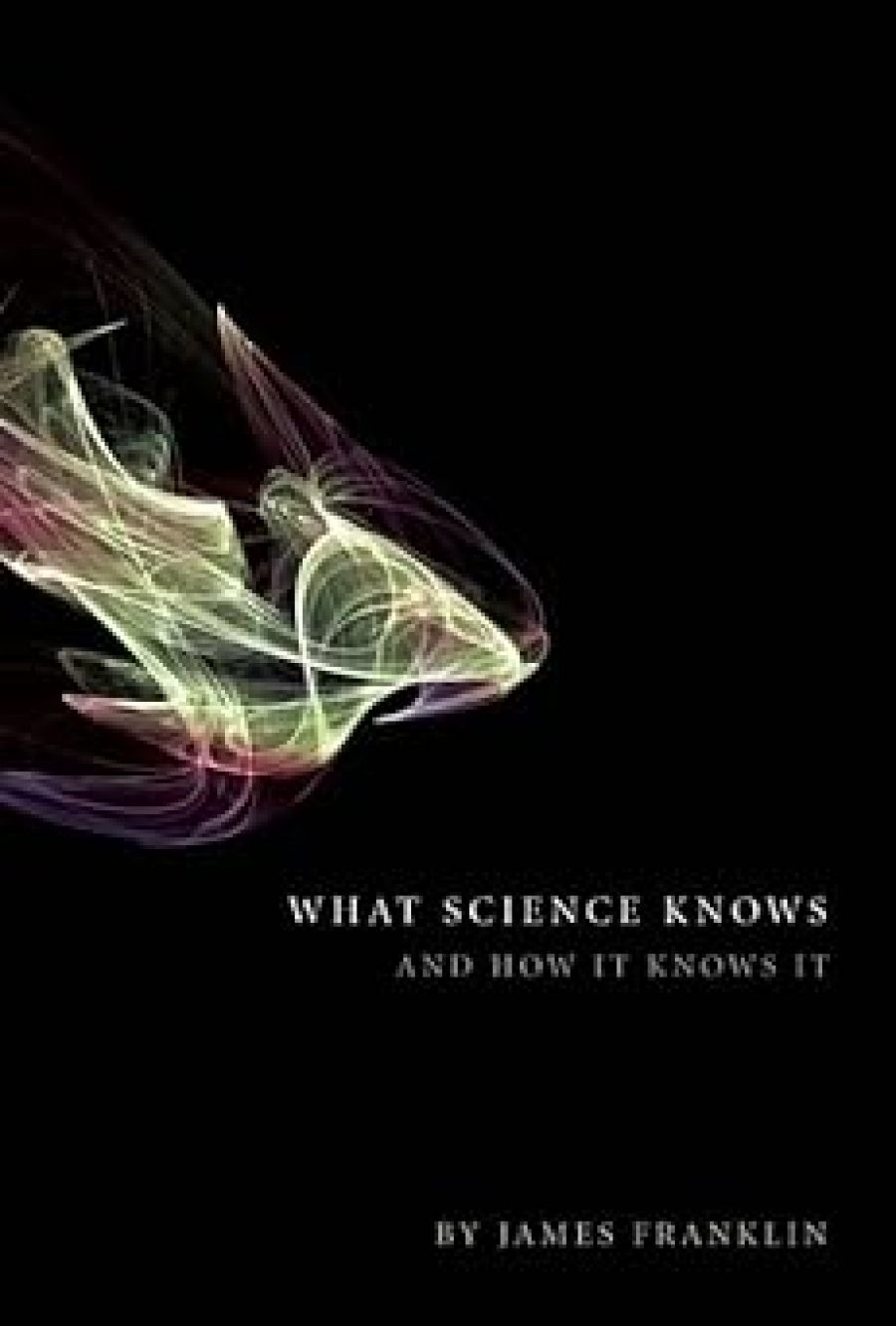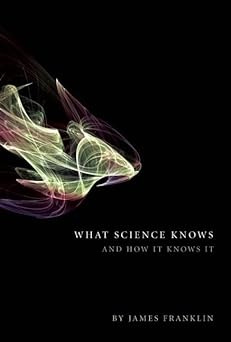
- Free Article: No
- Contents Category: Science and Technology
- Review Article: Yes
- Article Title: No absolutes
- Online Only: No
- Custom Highlight Text:
There are three ways to read this delightful book. The first – your reviewer’s method – is to romp through it picking places to linger and relish. The second way is to take a few months off and study every page, taking notes. Students and specialists will do this and be rewarded. The third way is to have it handy on the shelf to return to when a topic turns up needing clarification.
- Book 1 Title: What Science Knows
- Book 1 Subtitle: And how it knows it
- Book 1 Biblio: Encounter Books, $33.95 hb, 283 pp
- Book 1 Cover Small (400 x 600):

But what is it for? What, for that matter, as my colleague Alan Saunders asked Franklin on ABC Radio National in The Philosophers’ Zone, is the philosophy of science supposed to represent to research scientists, apart from an annoyance, a distraction? Scientists don’t, in my experience, worry much about philosophy. They have a generalised concern about the nature of evidence, but regard this more as an extension of technical questions: how do you know you’re looking at the remains of a living thing in moon rock rather than at an artefact in the crystal? How do you know that there is alien DNA in the sample without testing it for contamination? Scientists, like the rest of the public, see their work as a series of refinements: the polishing of the jewel of knowledge. It gets shinier and more lustrous, but never perfect.
This is all very well, but far from sufficient. Here, for example, is a sentence from a book by David Bentley Hart, Atheist Delusions: The Christian Revolution and Its Fashionable Enemies (2009), on Richard Dawkins’s arguments in The God Delusion (2006) which ‘a college freshman, midway through his first logic course could dismantle in a trice’. Is this true? Could a journeyman philosopher really shred Richard Dawkins just like that? Take him down in one intellectual blow? If so, why hasn’t this happened? There have been assaults, not least from Terry Eagleton, but they have been based more on rhetoric than on deadly logic. Dawkins still stands.
Or, more significantly perhaps, could the philosophy of science be used to clean up the case for climate change, evolution or disputes about the nature of consciousness? Would the philosopher illuminate the strength of the arguments, or merely offer word games to confuse us even further?
The problem is this, one that occurs in every chapter of Franklin’s book: there are no absolutes in science. Nothing is finally proven to the level a philosopher would accept as complete. Even two plus two is not always equal to four, if I happen to define my pairs as couples invited, for example, to my house for dinner. One of a couple suddenly dies, so my sum becomes three. ‘Definitions! Units!’ as my old maths master used to exclaim. Nothing is absolute.
This is why Franklin is right to cavil at the contribution of that hero of scientists (and of Alan Saunders), Karl Popper, whose work is criticised for two reasons, the first being that famous falsifiability. Offer a theory, test it and then find it wanting, by all means; but do not then assume that you have settled things and discovered the universal truth. Other conditions could still offer exceptions.
The second reason is that the sciences such as biology and oceanography, which are based on the accumulation of material, are essentially different from the abstruse physical sciences. Unlike physics (typically, in this century, in a real mess), those subjects are advanced by an Everest of knowledge that becomes ever greater. Physics, examining the very small or stupendously large, is different and must propose explanations that fit more naturally into the Popperian scheme of things and, as a result, seems to get messier and messier. This is why the grand smear that the theories of climate change are not Popperian is dismissed by Franklin with elegant disdain. You can’t falsify an entire complex field of investigation.
Thomas Kuhn is also examined and found wanting. I once sat, by the way, in Kuhn’s office, on his very chair at MIT, using his phone, trying to persuade him to come on to the campus to be interviewed about his great work on scientific revolutions and ‘paradigm shifts’. He declined rather plaintively, saying that his ideas had been completely misunderstood and he no longer wanted public attention. His ideas, he said, had become a cliché.
The other enfants terribles in the field also make swift appearances: Feyerabend, Lakatos, the postmodernists, and Sokal with his hoax, showing how language can distort meaning and how much some philosophers get away with too much by concentrating on too narrow a field of scientific investigation.
So, to reiterate: what is the philosophy of science for? The answer is offered by Franklin: to tell us what we really know. And what we don’t know. In today’s world the stakes couldn’t be higher. What do we really understand about global warming? Do Creationism and intelligent design have something important to tell us about any inadequacies of Darwinism? Is human consciousness merely the product of a complex machine, wet or dry? How do we make policy based on research in progress?
This is where the philosopher can be a helpful guide – but also an annoyance. It is useful to show where gaps in our knowledge persist and how much the scientists’ assurances are not quite adequate. But it is a nuisance to demand a level of evidence that does not match the urgency of the case. There are many uncertainties in the science of climate, but the perceived urgency of taking action is a matter of risk management that cannot wait for all the refinements on order. The case for intelligent design may have some technical merits (very few), but the purity of a philosopher’s assessment rings hollow when examined in the light of the politics of it all.
Nonetheless, Franklin is surely right when he avers about climate and evolution: ‘But the complexities of the evidence are such that a higher standard of politeness to skeptics who raise serious problems would be well-advised.’
Franklin is a mathematician, as well as a philosopher. He is willing, ruthlessly, to put a red line through anything that does not work formally. Politics, social merit or other incidentals don’t impress him. This is how Kuhn is given the flick as a mere excretion of the humanities. But he is also very funny (hence Yes, Minister and other walk-ons). I particularly enjoyed the deployment of ‘the worst argument in the world’, a postmodern guide I have used in the writing of this review. After David Stove in 1985 it goes: We can know things only as they are related to us; under our forms of perception and understanding; or insofar as they fall under our conceptual schemes etc..
I like to think of this approach as the Paris Hilton School of epistemology. What Science Knows is chock full of such gems, and I intend to plagiarise them shamelessly. But I may also send a copy to Tony Abbott, who last year described the suggestion that the science of climate change is settled as ‘crap’.
Is any branch of science ever settled? Is there ever a point when you know enough to be sure you must take action? Is the science of blood pressure settled? Surely not. But I shall continue taking the pills.
Scientists are in search of truth. They must be driven by curiosity and passion, but be aware that such impetus has its own dangers.
As Galileo wrote (quoted by Franklin): ‘In natural sciences whose conclusions are true and necessary and have nothing to do with human will, one must take care not to place oneself in the defence of error; for here a thousand Demostheneses and a thousand Aristotles would be left in the lurch by every mediocre wit who happened to hit upon the truth for himself.’
First, know your science.


Comments powered by CComment